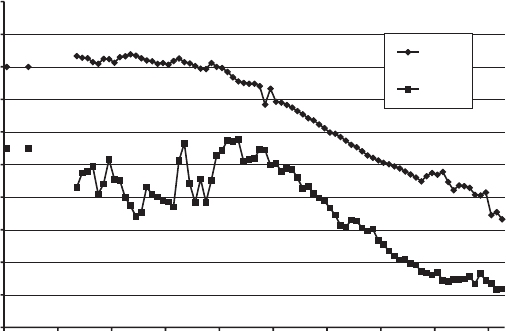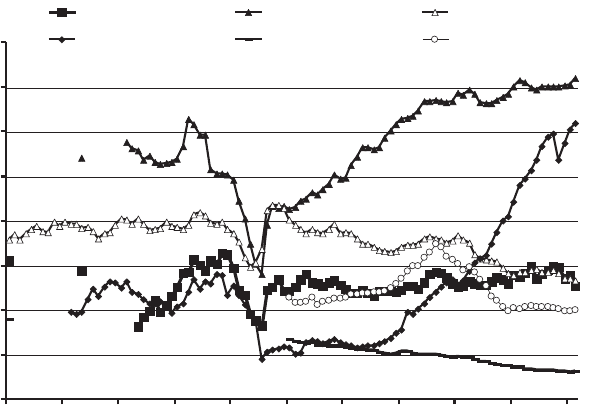Kasaba R. The Cambridge History of Turkey: Volume 4, Turkey in the Modern World
Подождите немного. Документ загружается.

feroz ahmad
By 2006 the major political issue was the succession to President Ahmed
Necdet Sezer, a militant secularist, whose term expired in May 2007. Secu-
lar Turkey was alarmed when it realised that Prime Minister Erdo
˘
gan was
determined that his party should elect the president while it had the necessary
majority in parliament to do so. The opposition therefore called for an early
general election hoping that the JDP, whose popularity was thought to be
declining, would not have the necessary votes in the new parliament to elect
its nominee as president. It would therefore have to settle for a compromise
candidate and elect an above-party president. But Erdo
˘
gan stated categorically:
‘Don’t expect early elections.’ On 10 April 2007, President Sezer, presiding over
his last NSC meeting, warned his audience that religious fundamentalism had
reached alarming proportions and Turkey’s only guarantee against this threat
was its secular order, hinting that a military intervention was still on the cards
if the governing party persisted in electing an ‘Islamist’ president. However,
Erdo
˘
gan was faced with opposition from the radical ‘Islamist’ wing in his own
party. Led by B
¨
ulent Arınc¸, the speaker of the house, they demanded that a
committed ‘Islamist’ be nominated, failing which Arınc¸ would put himself
forward, thus dividing the party. Erdo
˘
gan compromised and chose Foreign
Minister Abdullah G
¨
ul, a founding member of the JDP and respected by the
secularists as a moderate Islamist.
The Republican opposition in parliament objected that the president could
not be elected without a two-thirds quorum in the chamber, and they took
their objection to the constitutional court. The court agreed, and annulled the
first round of voting on 1 May 2007. When, five days later, parliament again
failed to elect Abdullah G
¨
ul, his candidacy was withdrawn and the scene was
set for an early general election, to be held on Sunday 22 July. The parties
began to negotiate mergers so as to present the electorate with a robust and
united front against the JDP. The ‘centre-left’ RPP and the Democratic Left
Party (DSP) failed to agree on the terms of a merger, though the DSP agreed
to fight the election alongside the RPP. The centre-right parties – the True Path
and the Motherland Party – tried to reinvent themselves by calling themselves
the Democrat Party, hoping that the magic of the name would bring them
the necessary 10 per cent of the vote to get into parliament. However ANAP
withdrew from the negotiations and the party decided not to contest the
election, thereby virtually disappearing from political life. Erdo
˘
gan tried to
appeal to the centre-right voters by purging his party’s electoral list of radical
‘Islamists’ so as to present a moderate face. The Nationalist Action Party
decided to strengthen its ultra-nationalist image by including in its electoral
list Tugrul T
¨
urkes¸, the son of Alparslan T
¨
urkes¸, the party’sfounder. Meanwhile
264
Politics and political parties in Republican Turkey
there were massive demonstrations in Ankara, Istanbul and Izmir against the
JDP and in support of a secular Turkey.
The result of the general election of 22 July 2007 confounded most predic-
tions. The JDP performed far better than expected, winning 45.5 per cent of the
vote and 341 parliamentary seats, while the RPP won 21 per cent and 112 seats,
and the Nationalist Action Party won 15 per cent and 71 seats. Independents
unofficially representing the DSP, which would not have cleared the 10 per
cent barrier, won 23 of the 26 independent seats and were therefore able to
articulate Kurdish grievances in the next parliament.
The 2007 election is considered one of the most important elections of the
multi-party period. It highlighted the bankruptcy of the traditional centre-
right parties – the DYP and ANAP – with the failure of the newly created
Democrat Party to enter parliament. Some therefore see the JDP, despite
its Islamist roots, as the new representative of the centre-right. The RPP’s
poor performance under its current leadership forced it to find a new leader
who would take the party from ultra-nationalism back to the kind of social
democracy that made it so successful in the 1970s. The ultra-nationalist NAP
emerged as the party of the extreme right, having doubled its share of the
vote since the November 2002 election. The 2007 election was undoubtedly
one of the most important elections of the multi-party period, marking the
bankruptcy of the centre-right. Following the elections, Erdo
˘
gan again chose
Abdullah G
¨
ul as the AKP’s candidate for the presidency, and he was duly
elected the eleventh president of the Republic on 28 August 2007. At the time
this chapter was written (October 2007) the AKP controlled three principal
levers of power – the executive, the legislature and the presidency. It remained
to be seen whether the party would use its powers to pursue policy to maintain
the secular character of society or try to impose traditional–‘religious’ values
on Turkey.
265
10
Economic change in twentieth-century
Turkey: is the glass more than half full?
s¸evket pamuk
Introduction
One metaphor for assessing Turkey’s economic performance in the twentieth
century may be to ask whether the glass is half full or half empty. On the one
hand, Turkey has experienced far-reaching economic changes since the early
1920s. The primarily rural and agricultural economy of the early twentieth
century has transformed into a mostly urban economy. Average or per capita
incomes have increased more than fivefold during this period. Other indicators
of standards of living have also improved significantly. Life expectancy at birth
has almost doubled from under thirty-five years in the interwar era to sixty-
nine years. Adult literacy rates have increased from about 10 per cent to about
90 per cent (see table 10.1).
On the other hand, it would be misleading to judge economic performance
only in absolute terms. The twentieth century, especially its second half, was
a period of rapid increases in the standards of living in most parts of the
developing world, of which Turkey is still considered a part. Increases in per
capita incomes in Turkey since the First World War have been close to, but
slightly above, world averages and averages for the developing countries. The
income per capita gap between Turkey and the high-income countries of
Western Europe and North America was about the same in 2005 as it was
on the eve of the First World War. Certainly, Turkey has not been one of the
miracle-producing economies of the twentieth century. Moreover, its record
in human development has been weaker than its record in economic growth,
close to but perhaps below average for the developing world. In addition,
these increases or improvements have not all been achieved at a steady pace.
In fact, Turkey’s economy has been plagued by recurring political and macro-
economic instability that has led to a number of crises, especially in the second
half of the twentieth century. The most severe of these, a financial crisis,
occurred in 2001. That the economy managed to rebound strongly within a
few years should perhaps remind us of the above metaphor.
266

Table 10.1. Economic and human development indicators for Turkey, 1913–2005
1913 1923 1950 1980 2005
Population (mill.) 17 13 21 45 72
Share of urban pop. (5000 inhab.) in total pop. (per cent) 28 24 25 44 68
Share of agriculture in the labour force (per cent) 80 85 84 51 34
Share of agriculture in GDP (per cent) 55 42 54 26 11
Share of industry in GDP (per cent) 13 11 13 21 26
GDP per capita, PPP adj. in 1990 US$ 1,200 710 1,620 4,020 7,500
GDP per capita as per cent of (W. Europe + US) 29 16 24 25 30
GDP per capita as per cent of developing countries 168 n.a. 188 219 225
GDP per capita as per cent of world 79 n.a. 77 89 117
Life expectancy at birth (years) 30? n.a. 47 62 69
Adult literacy (ages above 15 in per cent) 10 n.a. 32 69 89
Annual growth rates (in per cent) 1913–50 1923–50 1950–80 1980–2005 1913–2005 1 923 –2005
Population 0.61.82.61.91.62.1
GDP per capita 0.83.13.12.52.02.9
Total agricultural output 1.04.52.91.21.72.9
Total industrial output 3.15.87.75.85.36.5
Notes: The inclusion of women working in the family farm in the labour force but the exclusion of urban women working at home from the
labour force tends to overstate the share of agriculture in Turkish employment statistics. Per capita GDP in constant US dollars is the basic
indicator for examining long-term increases in average incomes. These series are calculated with a purchasing power parity adjustment in order
to take into account the fact that price levels tend to be lower and the same dollar income purchases more in lower-income countries.
Sources: For Turkish data except per capita GDP: State Institute of Statistics, Statistical Indicators, 1923–2 002 ; for GDP per capita series: Maddison,
The World Economy, 2001 and 2003; Eldem, Osmanlı;
¨
Ozel and Pamuk, ‘Osmanli’dan Cumhuriyete’; and Pamuk, ‘Estimating Economic Growth’.
s¸evket pamuk
Also on the positive side, the last decade has witnessed important changes
in Turkey’s relations with the European Union (EU). Although the first agree-
mentfor cooperation betweenTurkey and whatwasthen the Common Market
dates back to 1963, both sides remained doubtful about Turkey’s integration.
Turkey’s first application for membership in 1987 was turned down, but it
joined the European customs union in 1996. After a reasonably successful
implementation of the customs union for one decade, formal negotiations for
membership in the EU began in 2006.
I begin below with several key indicators that offer a summary evaluation
of Turkey’s economic development record since 1923 or 1913 in a compara-
tive framework. The rest of the chapter attempts to understand that record.
In recent years, a growing literature has emphasised the contribution of the
social and political environment, and more specifically of institutions defined
as written and unwritten rules and norms, to long-term economic change.
In the second section, I will sketch a framework for understanding the link-
ages between the evolution of institutions and economic change in twentieth-
century Turkey. I will then examine, in the third section, world economic
conditions, government economic policies and the basic macro-economic out-
comes for Turkey in three sub-periods, in order to gain additional insights into
its absolute and relative growth record. Withits very largesharein employment
and total output until recently, agriculture is of central importance also for
understanding long-term economic development in Turkey. Similarly, income
distribution, or more generally the distribution of gains, must be part of any
long-term evaluation. In the fourth section, I focus on these two themes, agri-
culture and income distribution and regional disparities, before offering some
concluding remarks in the fifth section.
Economic growth and development record
In the 1920s, less than 25 per cent of Turkey’s population lived in urban cen-
tres with more than 5,000 inhabitants. The rural–urban shares remained little
changed until after the Second World War, but Turkey has been experienc-
ing rapid urbanisation since then. The proportion of the population living in
urban centres, as defined above, increased to 44 per cent by 1980 and to 68 per
cent by 2005. Rapid urbanisation has been accompanied by large shifts within
the labour force. Agriculture’s share in total employment declined from about
80 per cent in 1913 and in 1950 to 34 per cent in 2005, while industry’s share
rose from about 9 to 23 per cent, and that of services increased from 11 to 43
per cent. Similarly, agriculture’s share in GDP declined from about 55 per cent
268

Economic change in twentieth-century Turkey
0
10
20
30
40
50
60
70
80
90
100
1910 1920 1930 1940 1950 1960 1970 1980 1990 2000
AGL/LF
AGL/GDP
Graph 10.1 Share of agriculture in GDP and labour force in Turkey, 1910–2000
in 1913 and 54 per cent in 1950 to 11 per cent in 2005. The share of industry has
increased from about 13 per cent in 1913 to 26 per cent in 2005 while the share
of services has increased from 34 to 64 per cent during the same period (see
table 10.1 and graph 10.1).
The beginning date or base year for long-term comparisons of economic
growth (1913 vs. 1923) requires an explanation. A decade of wars beginning in
1912 had resulted in a dramatic 20 per cent decline in population and as much
as 40 per cent decline in per capita income by 1922. As a result, the GDP per
capita levels for Turkey were sharply lower than long-term trend values in
the early 1920s. For this reason, the year selected for long-term comparisons
makes a big difference. While I provide values for both base years in table 10.1,
for most comparisons I will use 1913, which is also used in most international
comparisons.
Per capita income in Turkey and the rest of the Ottoman Empire rose
during the nineteenth century. Nonetheless, the gap between the high-income
countries of Western Europe and the United States and the developing world,
including the Ottoman Empire, widened considerably during the century
before the First World War, due to the rapid rates of industrialisation in the
former group. GDP per capita in the area within the present-day borders of
Turkey was approximately US$ 1,200 in 1913 (see table 10.1). This was 29 per
cent of the level of GDP per capita in the high-income countries of Western
Europe and the United States, calculated on a population-weighted basis, and
269

s¸evket pamuk
0
10
20
30
40
50
60
70
80
1900 1910 1920 1930 1940 1950 1960 1970 1980 1990 2000
Turkey/(W. Eur+USA) S. Europe 5 /(W. Eur+USA) LA 8 / (W. EUR+USA)
S. Korea / (W. Eur+USA) Africa Middle East
Graph 10.2 GDP per capita as percentage of (USA + W. Europe), 1900–2000
168 per cent of the GDP per capita income in the developing countries of Asia,
Africa and Latin America, also calculated on a population-weighted basis and
for the same year.
Two world wars and a great depression later, per capita income in Turkey
in 1950 was more than 30 per cent higher, at US$ 1,620 constant or inflation
adjusted. This was equal to 24 per cent of the per capita income of the high-
income countries and 188 per cent of the per capita income in the developing
countries.By 2005, GDP per capita in Turkeyhad reachedUS$ 7,500, an increase
of morethan fivefold since 1913. Thisfigure corresponded to about 30 per cent of
the level of GDP per capita in the high-income countries of Western Europe and
the United States, and approximately 225 per cent of the GDP per capita income
of the developing countries for the same year. In other words, average incomes
in Turkey have increased at about the same rate as those in high-income
countries since 1913. Turkey has not been able to close any of this large gap.
At the same time, increases in average incomes in Turkey since 1913 have been
slightlyfaster than those in the developing world.If 1923 were chosen as the base
year, Turkey’s long-term record would look considerably better (table 10.1)
In graph 10.2, I provide per capita GDP series for Turkey and a number
of other regions and continents as percentages of the average for Western
270
Economic change in twentieth-century Turkey
Europe and the United States for the period since 1913. This graph allows
further insights into Turkey’s comparative economic record in the twentieth
century. It shows that while its growth record was better than the averages
for Latin America, Middle East and Africa as a whole, Turkey has lagged well
behind Southern Europe and East Asia since 1950.
However, GDP per capita is not an adequate measure of economic develop-
ment or more generally of standards of living. For this reason, the human devel-
opment index (HDI), a broader measure first introduced by the United Nations
in 1990, has become quite popular. HDI has three components: longevity as
measured by life expectancy at birth; knowledge as measured by a weighted
average of adult literacy; and years of schooling and income as measured by
GDP per capita. Estimates for HDI for Turkey and other countries are available
for the benchmark years of 1950 and 1975, as well as for the period since 1990.
Recently, I made a separate estimate for Turkey in 1913, making use of the data
cited above. These estimates allow us to obtain an overview of the standards of
living in twentieth-century Turkey and insert it into a comparative framework
(table 10.2).
It is not easy to compare the evolution of HDI of developing countries with
those of developed countries today or in the past. For this purpose, I present in
the last column of table 10.2 a measure for the extent to which countries have
reduced the distance between their level of HDI of 1950 and the maximum
attainable score of 1. While Turkey and many other developing countries
with low initial levels have experienced large increases in HDI since 1950, the
developed countries have generally shown larger increases when measured as
per cent of maximum possible increase. In terms of this latter measure, Turkey
has done better than African and Eastern European countries, about the same
as Latin American countries, and has lagged behind East Asian countries since
1950.
Changes in life expectancy at birth, or e(0), provide a dramatic example
of changes in twentieth-century Turkey. The earliest period for which we
have estimates of e(0) is for the 1930s, when the figure was thirty years. Life
expectancy at birth had increased to forty-seven years by 1950 and to sixty-two
years by 1980.In2004, the latest year for which we have the estimates, e(0)
stood at seventy years: sixty-eight years for men and seventy-three years for
women (table 10.1). While official estimates are not available for adult literacy
in the early years of the Republic, it can be safely assumed that the rate did not
exceed 10 per cent in the 1920s. In 1935, the literacy rate for individuals over
the age of fifteen was 19 per cent: 31 per cent for men and only 8 per cent for
women. By 1950, the adult literacy rate had increased to 28 per cent: 47 per cent
271

s¸evket pamuk
Table 10.2. Changes in the human development index, 1913–2 003
Country 1913 1950 1975 2003
Change in
1950–2003 as per
cent of possible
Western Europe 0.580 0.707 0.848 0.935 77.8
North America 0.643 0.774 0.861 0.945 75.7
Japan 0.466 0.676 0.851 0.943 82.4
China n.a. 0.225 0.522 0.755 68.4
India 0.143 0.247 0.406 0.602 47.1
Africa n.a. 0.271 n.a. 0.549 38.1
Greece 0.625 0.800 0.912 76.5
Russia 0.345 0.694 n.a. 0.795 33.0
Bulgaria 0.403 0.607 n.a. 0.808 51.1
Argentina 0.511 0.526 0.784 0.863 71.1
Mexico 0.270 0.484 0.688 0.814 64.0
Brazil 0.249 0.448 0.641 0.792 62.3
South Korea n.a. 0.459 0.687 0.901 81.7
Malaysia n.a. 0.407 0.614 0.796 65.6
Thailand 0.388 0.603 0.757 0.778 44.1
Indonesia n.a. 0.337 0.467 0.697 54.3
Tunisia n.a. 0.303 0.512 0.753 64.6
Iran n.a. 0.331 0.507 0.736 60.5
Egypt n.a. 0.291 0.433 0.659 51.9
Nigeria n.a. 0.194 0.326 0.453 32.1
Turkey 0.190 0.382 0.592 0.75 0 59.5
Notes: Regional or continental averages are weighted by the population of the individ-
ual countries. For definition of HDI, see the text. In the last column, the maximum
possible improvement in HDI is 1-(HDI in 1950).
Sources:Crafts(1997) and (2002)for1913–1975 values except for Turkey in 1913 and
United Nations Development Programme, Human Development Report 2005 for 2003
values.
for men and 13 per cent for women. In 2005, it stood at 89 per cent: 95 per cent
for men and 82 per cent for women (table 10.1).
Since 1913 and especially since 1950, levels and improvements in life
expectancy in Turkey have been comparable to those in other developing
countries with similar levels of income. However, since 1913 and 1950 educa-
tion levels in Turkey as measured by literacy, years of schooling and school
enrolment have been lagging significantly behind education levels in devel-
oping countries with similar levels of GDP. At the same time, the incidence
of poverty in Turkey has been lower in comparison to developing countries
with similar levels of income. These contrasts can be clearly observed in a
272
Economic change in twentieth-century Turkey
comparison of Turkey with countries in Latin America since 1913 and 1950.
Levels of schooling in Turkey have been below the averages for the larger
Latin American countries throughout the twentieth century. The lagging per-
formance in education is not a matter for the historical record alone, however.
This deficit will make itself increasingly felt in the decades ahead. For further
increases in GDP per capita, Turkey will need a better-educated labour force
and significant increases in the technology and knowledge component of its
economy.
Along with other Muslim majority countries, Turkey also lags behind devel-
oping countries with comparable levels of per capita income in indices aiming
to measure gender equality and the socio-economic development of women.
1
One other reason why many of Turkey’s human development measures have
been lagging behind is the large regional differencesinthese indicators between
the mostly Kurdish south-east and the rest of the country, as discussed on
pp. 296–97 below.
Institutional change and economic growth
For decades it was believed that economic growth results in part from the accu-
mulation of factors of production and improvements in their quality through
investment in machines and skill formation, and in part from increases in pro-
ductivity derived from advances in technology and organisational efficiency.
In recent years, however, a useful distinction is being made between the proxi-
mate and the ultimate sources of economic growth. The former relates to the
contributions made by the increases in factor inputs and productivity as cited
above. The latter refers to aspects of the social and economic environment that
influence the rate at which inputs and productivity grow. A growing literature
emphasises the importance of institutions or written and unwritten rules of a
society and policies such as property rights and their enforcement, norms of
behaviour, political and macro-economic stability, which affect the incentives
to invest and innovate. In this new perspective, the basic function of institu-
tions is to provide certainty in economic activity. More complex economic
structures will not emerge unless institutions can reduce the uncertainties
associated with such structures. Recent research has also revealed very large
differences in total productivity levels between countries. It appears that more
than half of the differences in levels of per capita production are due to the
1 Based on the World Bank, World Development Report, and United Nations Development
Programme, Human Development Report for recent years.
273
